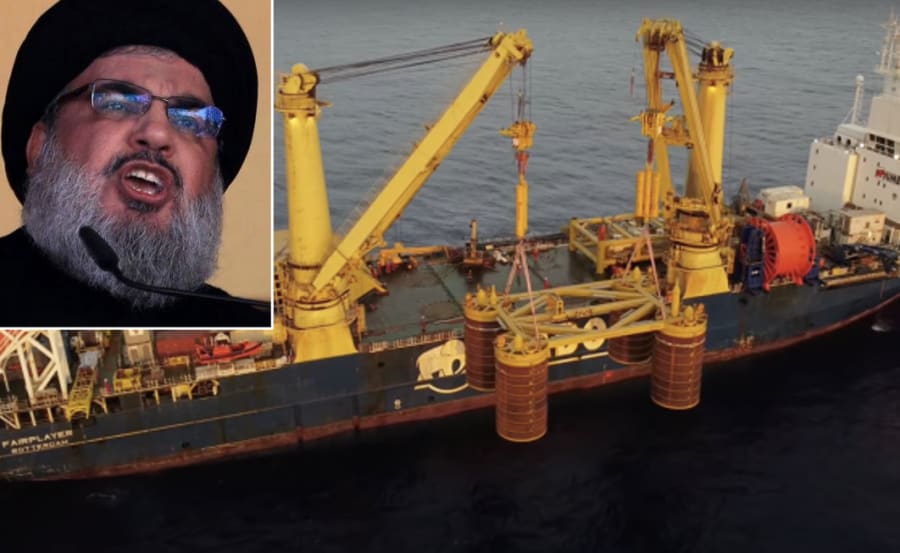Hezbollah leader threatens to strike Israel if maritime border dispute not settled
Nasrallah also claims Hezbollah had nothing to do with the detention of Archbishop Moussa al-Hage

The leader of the Lebanese terror group Hezbollah threatened to bomb Israel’s disputed natural gas field when asked in an interview on Monday about the ongoing dispute between Israel and Lebanon over their maritime border.
Hassan Nasrallah even bragged about a recent drone launch toward the Karish field.
He further stressed that if Israel begins the extraction of oil and gas from Karish in September, before it reached an agreement with Lebanon, there would “be a problem" that his organization will handle. He did not specify how.
Extending his threat even further, Nasrallah stressed that all of Israel’s territory is within the range of Hezbollah’s missile capabilities.
“All fields are under threat, not only Karish, and no Israeli target at sea or on land is out of the reach of the resistance's precision missiles,” he said, noting that such an operation is contingent upon Israel’s actions and U.S. mediation of the crisis.
Lebanese authorities accused Israel of infiltrating contested waters and used U.S. envoy to the region Amos Hochstein as mediator to carry a message of compromise to Israel.
A few weeks ago, Beirut announced it is willing drop its partial claim to the offshore Israeli gas field in exchange for full control over a second one. Meanwhile, Hezbollah has been trying to take advantage of the conflict.
The Hezbollah leader also addressed U.S. President Joe Biden’s recent trip to the Middle East, saying that “the U.S. president does not want a war in the region, and this is a chance for us to press to get our oil.”
Nasrallah suggested that Lebanon could benefit from bringing in Iranian oil to its plant. However, he blames the Lebanese government for inaction.
“I'm ready to bring free Iranian fuel for the Lebanese power plants if the Lebanese government agrees to this, but unfortunately there is no political courage in Lebanon for such a step, because they fear U.S. sanctions on individuals and their families,” he said.
Nasrallah also claimed in the interview that his organization had nothing to do with the recent apprehension of the Maronite Archbishop, Moussa al-Hage, upon his return from Israel last week.
“I tell all Lebanese people, especially Christians, that Hezbollah has nothing to do at all with Archbishop al-Hage's case and we are not going to intervene in it,” Nasrallah told Lebanon’s Al Mayadeen network.
In an interview that marks 40 years to Hezbollah’s establishment, Nasrallah claimed the militant group only learned about the bishop’s arrest “from the media, like every other Lebanese.”
He stressed that the action to arrest him was likely given by the Lebanese security forces, saying: “There is a law in Lebanon and security agencies address everything related to collaboration with Israel.”
“The assumption by some that the Lebanese security services operate under the command of Hezbollah is a lie, a slander, and an injustice to the security services, and to Hezbollah,” Nasrallah added.
Al-Hage carries titles as the archbishop of the Archeparchy of Haifa and the Holy Land and the patriarchal exarch of Jerusalem and Palestine and Jordan. The archbishop had traveled to Israel to raise funds for the Maronite community – a Christian sect of Syrian origin based in Lebanon that has suffered persecution and discrimination throughout history.
His detention at a border crossing in the southern Lebanese city of Naqoura has raised an uproar among Middle East Christians.
Al-Hage was reportedly interrogated by a military court for eight hours. His passport and cell phone were taken from him, as well as nearly half a million dollars in remittances and medicines that he was transferring on behalf of Lebanese Maronites in Israel to their relatives in Lebanon, amid a dire economic crisis.
Nasrallah noted that "the transfer of funds from occupied Palestine to Lebanon is an act against the law, regardless of the reason behind it.”
He criticized people in Lebanon who claim that despite Israel being “an enemy,” for the archbishop it can also be “an ally, a friend and a future.”

Tal Heinrich is a senior correspondent for both ALL ISRAEL NEWS and ALL ARAB NEWS. She is currently based in New York City. Tal also provides reports and analysis for Israeli Hebrew media Channel 14 News.













